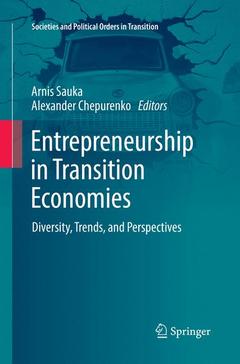Entrepreneurship in Transition Economies, Softcover reprint of the original 1st ed. 2017 Diversity, Trends, and Perspectives Societies and Political Orders in Transition Series

This book presents a state-of-the-art portrait of entrepreneurship in the transition economies of Central and Eastern Europe (CEE) and the Commonwealth of Independent States (CIS) as well as Georgia and Ukraine. Based on new empirical evidence, it highlights major trends in, characteristics and forms of entrepreneurship common to countries in transition. The contributions cover topics such as levels of opportunity-based entrepreneurship, incentives for innovation, dominance of large-scale international corporations, the role of family businesses, and opportunities for grass-roots entrepreneurship.
The first part of the book focuses on theoretical considerations regarding the establishment of sustainable entrepreneurial ecosystems and private business. In turn, the second part offers cross-border studies of entrepreneurial environments and activities, while the third and fourth present case studies on the current state and unique characteristics of entrepreneurship in various countries of the CEE and CIS as well as Georgia and Ukraine. Finally, the last parts discuss the role of institutions and policy recommendations.
Presents a state-of-the-art portrait of entrepreneurship in transition economies
Highlights major trends in entrepreneurship common to countries in transition from socialist planned economics to market economies
Offers case studies on various countries of the CEE and CIS
Date de parution : 08-2018
Ouvrage de 444 p.
15.5x23.5 cm
Date de parution : 07-2017
Ouvrage de 444 p.
15.5x23.5 cm



